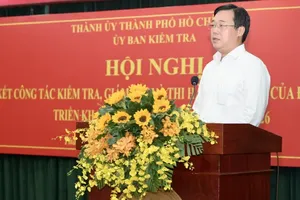
Following the PM’s decision, the municipal People’s Committee has assigned the Department of Information and Communications to work with other competent agencies to hold Vietnam Book Day annually.
Thanks to related agencies’ efforts in building the book reading movement, the city has achieved much success.
Deputy Director of the Department of Information and Communications said that according to the department’s plan, people’s committees in 24 districts have organized annual book reading-relating activities with various themes for children, seminars, story-telling exchanges and book collection for destitute kids.
Head of the Authority of Publication, Printing and Distribution under the Ministry of Information and Communications Chu Van Hoa said that HCMC has been leading the book reading movement because the movement has spread to other neighboring cities and provinces proving that HCMC is really the country’s economic and cultural hub.
He added that some southern provinces including Vung Tau, Can Tho, Bac Lieu and Ca Mau are learning HCMC’s experience in building book reading street; however, some of them failed.
He affirmed the city had had good tradition of book reading because there were many private bookstores in French colonial period and even now, many private bookstores in the city have been operating to attract bountiful readers. The development of bookstores in HCMC’s book streets have not only promoted book-reading movement but also made positive impacts on tourism.
Nevertheless, Deputy Chairman of Vietnam Printing Association Le Hoang was unhappy because as per the government’s instruction No. 42, a Vietnamese must read six books a year by 2010 while according to the reading culture encourage project approved by Deputy Minister Vu Duc Dam, a Vietnam person must read five books a year.
So far, more than 370 million books have been published; averagely a Vietnamese person reads four books yearly. Mr. Hoang said; “This proved reading habit of the Vietnamese people was poor because within ten years, we can’t achieve the target of the project.
After three–year establishment, the book street has earned turnover of VND105.75 billion ($4,558,850) with more than 2 million books on different topics being sold. Moreover, 43 activities with themes relating to the city and the nation’s cultural and political events and 51 cultural item exhibitions have been taking place in the book street.
Additionally, 433 exchanges and seminars of books, culture, education and society have been organized in the street.
Deputy director of Book Street Company Quach Thu Nguyet said that owing to exploiting typical cultural factors of southern people’s characteristic generally and Ho Chi Minh City dwellers particularly, the book street got a success. Moreover, the company has applied Vietnamese tradition “a life without a friend is a life without” into setting up the street where 20 publishing houses and book businesses gather to create a distinguishing feature in the street.
Mr. Hoa said that book reading habits transfer between generations to generations without halt. Accordingly, to cultivate book reading habit amongst people in the community, there should be annual honor by giving tittle to each individual and team in the various forms.
He pointed out the roles of family involvement and school influence in the formation of reading habits of small students. He suggested four measures to improve the habit including reading books in schools, making a list of books which students must read, providing more books for school library and for students in disadvantaged districts.
Mentioning to expand friendly library model carried out by non-government organization Room to Read, which was set up in 2000 with the aim to help developing countries’ education growth, Mr. Hoang petitioned that the Department of Education and Training should review library system in schools in 24 districts to provide more books to them especially schools in outlying districts and newly-established residential quarters.
























